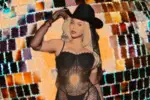We all know Taylor Swift. Some of us love her. Some of us hate her. Some of us have no opinion. But regardless of how you feel about her, one thing is for sure: We all know her. There is absolutely no way you do not. Few celebrities have been able to achieve name and face recognition to the point that anyone, no matter how old or how young, can identify them anywhere. Swift is one of them. She has built herself so much fame that her only peers might be the past few American presidents, Beyoncé and like, Cher or something. And if that wasn’t obvious enough, the songstress’s recent acceptance speech for Billboard’s first ever woman of the decade award seems to have solidified her superstardom forever.
Swift, the only person to ever win Billboard’s woman of the year award twice (in 2011 and 2014), has been getting a lot of buzz and recognition these past few months for all the work she has put into her career. Along with her woman of the decade win, she was also recently named the American Music Awards’ artist of the decade for everything she has contributed to the industry and culture these past 10 years. Following some serious drama with her former record label over what she could perform, Swift sang a beautiful medley of some of her most iconic songs before being presented with the award and truly blowing everyone’s minds.
However, what truly made Swift the performer/singer/artist/woman/whatever you want to call it of the decade was not simply her music, as that performance celebrated. What made the country-turned-pop titan worthy of being called the most influential celebrity of the decade is what she stands for: feminism and artists.
Of course, there can be many interpretations and opinions on how much of a feminist icon Swift actually is. There are plenty of reasons to discount her, from her early rejection of the word, to her near-constant feuding with other women, to the intersectionality with queer people and women of color that much of her feminist iconography lacked until this last album cycle.
But one still cannot deny that, in the past few years, the singer has tried her hardest to take responsibility for her missteps and set herself on the right path moving forward, such as when she finally endorsed several Democrats in the race for Congress last fall, made her stance on LGBTQ+ rights known and fought for when she supported the Equality Act with her “You Need to Calm Down” music video. She even stood up against her sexual assaulter in court and won.
One also cannot deny the impact Swift has had on artists’ rights. From early on in her career, she has fought for artists — especially women — to be credited and compensated properly for their work. When she was criticized for having co-writers on some of her music (as if collaboration with others somehow takes away from her own genius), she wrote an entire album by herself. She refused to have her music on streaming services without fair pay to all artists and called out Apple Music when they decided not to pay artists for streams of their music that occurred during a free trial. And when she agreed to sign a new record deal with Republic Records and Universal Music Group, she made sure to write into her contract that any sale of UMG’s Spotify shares would result in equity for their artists. The list goes on and on.
So when Billboard announced that Swift would be the recipient of the woman of the decade award, it was no real surprise. What was surprising was how in-depth Swift would go into the drama surrounding her former record label, as well as the hardship of being a woman in music, in her acceptance speech.
The Pennsylvania native starts out her speech by complimenting her presenter, actress and activist Jameela Jamil, chiming “She’s so supportive” as Jamil offers to hold the award because Swift is worried about it slipping from her hands. Then almost instinctively, Swift begins to go in on the scrutiny and road bumps that she has faced in her career, stating “It means I’ve seen a lot” when pondering what exactly it means to be the woman of the decade. She discusses how people always seem to have reservations about whether or not a woman deserves to be where she is or if she is really behind her own work when it comes to the music industry.
Then, she hits it. While talking about how many people assume it must have been a “savvy record label” that gave Swift her success, she delivers her first blow: a simple “It wasn’t.” From there, Swift delves into the way this decade saw her become a mirror for her detractors, doing everything they said she could not and using their criticism to fuel “musical satire” and “inspirational anthems,” such as “Mean,” “Shake It Off” and “Blank Space.”
She details how every little thing she did became a reaction to or adjustment from the way the public was portraying her. She laments the way her favorite female artists, from Lana Del Rey, to Lizzo, to Hayley Kiyoko, all had to work much harder than their male counterparts to achieve the success that they have because of these sexist public dismissals. Finally, she advocates for better producer’s agreements and record contracts because female artists of all kinds are having to fight extra hard just to get a fair shot in the first place.
https://www.instagram.com/p/B58ndH8Dxxd/
This is where she gets personal, shaming private equity for buying up artists’ music “as if it is real estate,” which she states has just happened to her without her “approval, consultation, or consent” at the hands of artistic manager Scooter Braun, whom she crowns “the definition of the toxic male privilege in [music] industry.” As Swift begs her fellow artists to stand up and not dismiss her legitimate concerns about an artist’s right to own their music just because “he’s always nice [to them],” it is clear that the singer is no longer going to change herself to prove her haters wrong. She is going to actively stand against them and demand that they change their minds instead.
This is what makes Taylor Swift the woman and artist of the decade. Not only did she impact these past 10 years so much, but she is also focused on changing the rules for artists and women in the decades that follow. Everything about this speech tells the story of Swift’s domination, from her subtly dropping lyrics while thanking the other female artists that have stuck up for her (“I will never ever forget it … like ever”), to the way she practically predicted the industry’s streaming shift and Billie Eilish’s woman of the year win, to how she exclaims her focus will no longer be on her critics, but on doing “whatever the hell [she] want[s].” Taylor Swift has made the 2010s what they are and with this speech, she made it known that her name will still be escaping our lips in the 2020s, 2030s and forever more. Thank you, Ms. Swift, for one “happy, free, confused, sometimes lonely, but mostly golden decade.” It has been an honor to watch you grow.
















